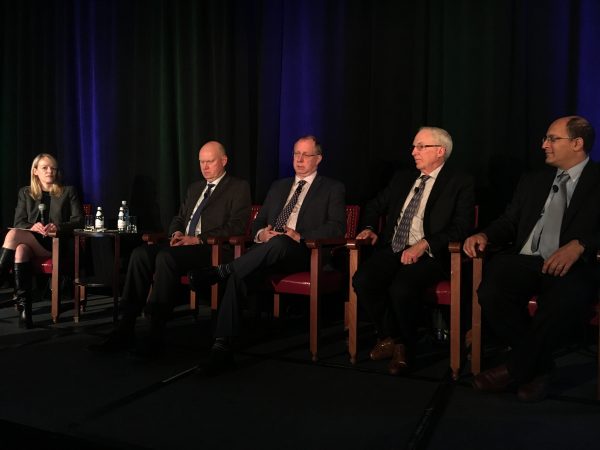
L-R: Amanda Murphy, BTIG; Thorsten Melcher, chief business officer, Xyphos; Stewart Abbot, chief scientific officer, Adicet Bio; Kurt Gunter, chief medical officer, Cell Medica; Christopher Haqq, chief scientific officer, Atara Biotherapeutics
Despite their significant progress in treating hematological cancers, CAR-T cell therapies’ development in solid tumors remains much further behind. Nevertheless, at a recent cell and gene therapy conference, executives from companies in the CAR-T space already had some ideas of what form the cell therapies for solid tumors could take.
In a panel discussion at the Alliance for Regenerative Medicine’s Cell & Gene Therapy Investor Day, there was particular interest among participants in pursuing CAR-Ts made from donor T cells, also known as allogeneic CAR-Ts.
Ultimately, experts and industry insiders regard both allogeneic CAR-Ts and their autologous counterparts – those made from patients’ own T cells – as having a role in the treatment of cancers, even if the “off-the-shelf” CAR-Ts are not as far along in development. The two currently approved CAR-Ts are Gilead Sciences’ Yescarta (axicabtagene ciloleucel), for diffuse large B-cell lymphoma, and Novartis’s Kymriah (tisagenlecleucel), for DLBCL and pediatric acute lymphoblastic leukemia.
The particular challenge with CAR-Ts in solid tumors is that whereas the ones for liquid tumors can attack “antigens of choice” that the cancer cells uniformly express – CD19, in the case of the leukemia and lymphoma targeted by Kymriah and Yescarta, or BCMA in multiple myeloma, the target of bluebird bio’s bb2121 – that’s not the case with solid tumors. Instead, solid tumors tend to express a variety of antigens, with significant diversity possible even between cells on the same tumor. Indeed, moderator and BTIG Managing Director Amanda Murphy brought up the availability of target antigens as one of the key hurdles to developing CAR-Ts in solid tumors.
But on the question of allogeneic versus autologous, allogeneic is particularly attractive for a variety of reasons, among them cost effectiveness, given the significant expense that goes into creating autologous CAR-Ts, said panelist Stewart Abbot, chief scientific officer of Adicet Bio.
Producing autologous CAR-Ts involves a laborious process of extracting T cells from the patient, shipping them to a manufacturing plant, using genetically engineered viruses to make them recognize target antigens on the surface of cancer cells, then shipping them back for infusion. The whole process can take two to three weeks.
But another reason, Abbot said, is that using the patient’s own cells creates a potential problem. “Many patients come to CAR-T after years of traditional therapy, which causes immune dysfunction and challenges manufacturing,” he said. “It’s quite difficult to get consistency from patient to patient, starting with materials that are different from patient to patient.”
Cell Medica Chief Medical Officer Kurt Gunter agreed, saying that his company’s “bias” was in favor of allogeneic. But while allogeneic CAR-Ts are more consistent, and hundreds of doses can be made from one donor, it’s necessary to go back to donors. “You have to have procedures in place to make a consistent product from Allo Donor A to Allo Donor B,” he said, adding that a potential solution in the long run would be to use an induced pluripotent stem cell bank. “In the short term, the solution is relying on healthy donors.”
Photo: Alaric DeArment, MedCity News












